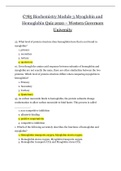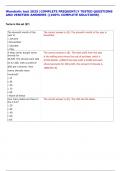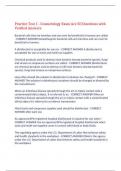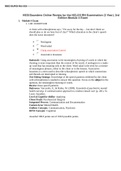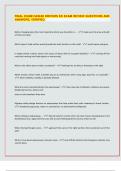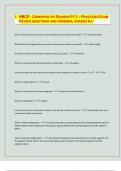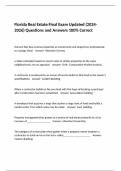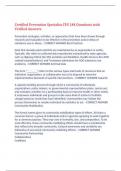Chapter 1
One of the main tasks of philosophy of science is to understand how techniques such as
experimentation, observation, and theory construction have enabled scientists to unravel so
many of nature’s secrets.
Earlier times-> ‘Aristotelianism’
Origins of modern science-> Europe 1500-1750 ‘scientific revolution’
|
Copernican revolution 1542-> from geo- to heliocentrism
\
- Led to Kepler’s discovery of ellipses instead of circular orbits (law one), and the
speeds of orbit (laws 2 and 3)
- Led to Galileo’s telescopic discoveries (moon mountains, stars, Jupiter’s moons)
Galileo’s most important contribution-> Galileo’s law of free fall-> objects fall at same rate
and accelerate uniformly (in equal increments of speed)
Galileo as first modern physicist
- first to show that mathematics could describe behavior of objects, not only
abstract principles
- first to emphasize the importance or experiments-> marks beginning of
empiricism
Descartes’ mechanical philosophy-> physical world consists of inert particles of matter
interacting and colliding with one another, guided by laws of motion
|
Became dominant in late 17th century
Culmination scientific revolution with Newton’s ‘Mathematical Principles of Natural
Philosophy’ in 1687
Newton’s laws of motion and principle of ‘universal gravitation’-> every body in the universe
exerts a gravitational attraction on every other body; the strength of the attraction between
two bodies depends on the product of their masses and on the distance between them
squared.
|
Newtonian conception of the universe became standard
Confidence in the Newtonian picture was shattered in early 20th century by:
- Relativity theory
- Quantum mechanics
,Einstein’s relativity theory-> showed that Newtonian mechanics did not work for objects
with high mass or velocity
Quantum mechanics-> showed that Newtonian mechanics did not work for very small
objects (e.g. subatomic particles)
In biology-> Darwin’s evolution theory in 1859
|
Natural selection instead of god’s creation
|
Widely accepted by start of 20th century
Important 20th century biological revolution-> genetics and molecular biology
|
1953 discovery structure of DNA (Watson and Crick)
|
Sparked molecular biology-> which studies the molecular basis of biological phenomena
In late 20th century, more focus on cognitive sciences
Also, more focus on social sciences, but are viewed by some as less sophisticated/predictive
than natural sciences
Task of philosophy of science is to analyze methods of enquiry.
|
Why philosophy?
\
Philosophers ask ‘Why?’ and ‘How?’ of knowledge, philosophers question
assumptions
How should science proceed? What methods of enquiry should it use? Are there limits to
scientific knowledge?
Pseudo-science vs Science
What is science?
- Must be falsifiable according to Popper
o It must be possible to test it against experience-> it is not compatible
with every possible course of experience
Otherwise, it is pseudo-science (Popper)
- E.g. psychoanalysis-> could explain all kinds of behavior
, - E.g. Marx’s history-> theory adjusted to allow for changes in real life, delay in
socialism
Science according to Popper
- E.g. general relativity-> light rays from distant stars would be deflected by the
gravitational field of the sun-> tested during solar eclipse
Popper’s view demands theories to be abandoned when they do not explain a
phenomenon, not to be adjusted
Adjustment of theories is not always bad though
- E.g. Uranus’ strange orbit was explained by hypothesising the existence of a
undiscovered planet-> was proven later (Neptune)
Usually, scientific theories meet with inconsistencies and need adjustments
Does science, like Popper argued, have an ‘essential nature?’
Chapter 2
Deductive reasoning-> if the premises are true, then the conclusion must be true-> the
truth of the premises guarantees the truth of the conclusion-> ‘all Fs have G, H is an F, so H
has G’
Inductive reasoning-> the truth of the premises does not guarantee the truth of the
conclusion-> conclusions could still be false, logically, even though the premises are true->
‘all examined Fs have been G, so other Fs are also G’
Only deductive interferences lead to ‘proof’
Popper-> scientists only need deductive reasoning-> to prove wrong/refute theories
But, scientists’ goal is often to prove true-> and often they need inductive reasoning for that
Why do we have faith in the logically flawed induction?
Hume-> we can’t rationally justify the use of induction-> Hume’s problem of induction
|
We presuppose the ‘uniformity of nature’-> that things that are relevantly similar to other
things of the same sort
|
Because we can imagine a non-uniform world, we can’t prove the uniformity of the one
we know-> if we try to prove it by looking at past, we reason circularly
|
Trying to convince, uses induction (it worked well before, so why not trust it?)
One of the main tasks of philosophy of science is to understand how techniques such as
experimentation, observation, and theory construction have enabled scientists to unravel so
many of nature’s secrets.
Earlier times-> ‘Aristotelianism’
Origins of modern science-> Europe 1500-1750 ‘scientific revolution’
|
Copernican revolution 1542-> from geo- to heliocentrism
\
- Led to Kepler’s discovery of ellipses instead of circular orbits (law one), and the
speeds of orbit (laws 2 and 3)
- Led to Galileo’s telescopic discoveries (moon mountains, stars, Jupiter’s moons)
Galileo’s most important contribution-> Galileo’s law of free fall-> objects fall at same rate
and accelerate uniformly (in equal increments of speed)
Galileo as first modern physicist
- first to show that mathematics could describe behavior of objects, not only
abstract principles
- first to emphasize the importance or experiments-> marks beginning of
empiricism
Descartes’ mechanical philosophy-> physical world consists of inert particles of matter
interacting and colliding with one another, guided by laws of motion
|
Became dominant in late 17th century
Culmination scientific revolution with Newton’s ‘Mathematical Principles of Natural
Philosophy’ in 1687
Newton’s laws of motion and principle of ‘universal gravitation’-> every body in the universe
exerts a gravitational attraction on every other body; the strength of the attraction between
two bodies depends on the product of their masses and on the distance between them
squared.
|
Newtonian conception of the universe became standard
Confidence in the Newtonian picture was shattered in early 20th century by:
- Relativity theory
- Quantum mechanics
,Einstein’s relativity theory-> showed that Newtonian mechanics did not work for objects
with high mass or velocity
Quantum mechanics-> showed that Newtonian mechanics did not work for very small
objects (e.g. subatomic particles)
In biology-> Darwin’s evolution theory in 1859
|
Natural selection instead of god’s creation
|
Widely accepted by start of 20th century
Important 20th century biological revolution-> genetics and molecular biology
|
1953 discovery structure of DNA (Watson and Crick)
|
Sparked molecular biology-> which studies the molecular basis of biological phenomena
In late 20th century, more focus on cognitive sciences
Also, more focus on social sciences, but are viewed by some as less sophisticated/predictive
than natural sciences
Task of philosophy of science is to analyze methods of enquiry.
|
Why philosophy?
\
Philosophers ask ‘Why?’ and ‘How?’ of knowledge, philosophers question
assumptions
How should science proceed? What methods of enquiry should it use? Are there limits to
scientific knowledge?
Pseudo-science vs Science
What is science?
- Must be falsifiable according to Popper
o It must be possible to test it against experience-> it is not compatible
with every possible course of experience
Otherwise, it is pseudo-science (Popper)
- E.g. psychoanalysis-> could explain all kinds of behavior
, - E.g. Marx’s history-> theory adjusted to allow for changes in real life, delay in
socialism
Science according to Popper
- E.g. general relativity-> light rays from distant stars would be deflected by the
gravitational field of the sun-> tested during solar eclipse
Popper’s view demands theories to be abandoned when they do not explain a
phenomenon, not to be adjusted
Adjustment of theories is not always bad though
- E.g. Uranus’ strange orbit was explained by hypothesising the existence of a
undiscovered planet-> was proven later (Neptune)
Usually, scientific theories meet with inconsistencies and need adjustments
Does science, like Popper argued, have an ‘essential nature?’
Chapter 2
Deductive reasoning-> if the premises are true, then the conclusion must be true-> the
truth of the premises guarantees the truth of the conclusion-> ‘all Fs have G, H is an F, so H
has G’
Inductive reasoning-> the truth of the premises does not guarantee the truth of the
conclusion-> conclusions could still be false, logically, even though the premises are true->
‘all examined Fs have been G, so other Fs are also G’
Only deductive interferences lead to ‘proof’
Popper-> scientists only need deductive reasoning-> to prove wrong/refute theories
But, scientists’ goal is often to prove true-> and often they need inductive reasoning for that
Why do we have faith in the logically flawed induction?
Hume-> we can’t rationally justify the use of induction-> Hume’s problem of induction
|
We presuppose the ‘uniformity of nature’-> that things that are relevantly similar to other
things of the same sort
|
Because we can imagine a non-uniform world, we can’t prove the uniformity of the one
we know-> if we try to prove it by looking at past, we reason circularly
|
Trying to convince, uses induction (it worked well before, so why not trust it?)


